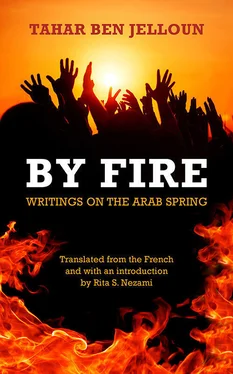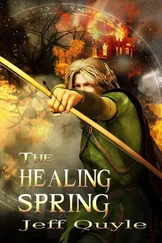The bombing of the synagogue in Djerba on April 11, 2002, that left twenty-one dead made the most vigilant observers realize that even though Ben Ali managed to keep the Islamists at bay in his country, his police didn’t succeed in stopping al-Qaida from committing bloody acts on his land. The suicide bomber came from an immigrant family in France and had connections with a German who had converted to Islam…
I had never heard about the small town of Sidi Bouzid. Yet, it’s there that it all started. Even though the incident was common and banal, this time it ended by triggering the irrevocable.
There was once a young man of twenty-eight, who had degrees but no job. He lived with his mother, brothers, and sisters. To make a little money, he got himself a fruit stand, a kind of cart on which vendors put seasonal fruit and vegetables to sell. Street vendors. We see them everywhere in Maghrebi cities. Often, cars stop or double park in front of them to buy last-minute fruit as dessert for lunch. These vendors can’t afford to have a store. They are poor and live from day to day. Sometimes their carts get in the way of the traffic, but everyone makes do. And, if a vendor “buys” the neighborhood police officer’s favor, he is left in peace and can sell his produce without being harassed. At times though, the same police officer, eager to demonstrate his strictness to his supervisor, is excessively zealous and forces the vendor to sell his produce elsewhere. Some spots are better located than others — those with more traffic are obviously better for selling. For these spots, one has to “pay.” Slipping one or two banknotes to a police officer is indispensable. The relationship between the police and vendors is one of the dominating and dominated, not unlike the small neighborhood mafias in Italy. You want to work? Well, you have to pay. If the vendor refuses, his cart is knocked over or confiscated for causing “trouble in the public thoroughfare.”
The amount of money a street vendor makes is not huge. It’s hardly enough to feed a small family. No one has ever seen a fruit and vegetable street vendor make a fortune. Mohamed Bouazizi was one of these people who toil every day to try to live in dignity. He refused to beg or accept the mafia compromises, to steal or do anything that is illegal. He could see very well how Ben Ali and his large family, his own and his wife’s, took advantage of the country shamelessly. Like all Tunisians, Mohamed knew about the lawlessness of Ben Ali’s in-laws, brothers, brothers-in-law, cousins, and friends, and how this pack’s members didn’t bother hiding while they made millions. All the big businesses, all big companies, and all foreign investments had to go through the “Ben Ali — Trabelsi law.” Everyone knew about this system; they talked about it, and then said, “We’ll close our eyes to it because Tunisia is finished with Islamists.” The well-off, middle-class people of Tunis, La Marsa, Sidi Bou-Saïd, and Hammamet boasted of living in a country “with perfect security,” “without robberies or attacks in the streets, where the police do their job really well.” People who collaborated with the regime enjoyed remarkable comfort and well-being. They were grateful to Ben Ali, this former military man, who knew so well how to capitalize on his country’s wealth. French and Italian politicians often viewed Tunisia as exemplary in the Arab-Muslim world. The Islamist leader Rached Ghannouchi took refuge in London. No one heard about him or his Ennahda movement anymore. Islamism was buried.
Mohamed Bouazizi had to stop his studies because his father died. Mohamed’s father was a farmworker. Mohamed has to take care of his entire family of seven. He buys a cart to sell fruit and vegetables in the street. However, he doesn’t have authorization from the police. The police harass him, but he refuses to give in to corruption. In any case, he doesn’t have the means. The police don’t leave him alone. As soon as they see him, they go after him, threatening to confiscate his cart and weighing scale. On this morning of December 17, 2010, he comes across a group of particularly mean police officers who confiscate his cart. One of the officers is a woman; she slaps him, and another spits on him. Supreme humiliation. He tries to get his cart back, explaining that he has seven people to feed and that he hasn’t done anything wrong…. The police officers’ aggressiveness doubles in ferocity. Mohamed’s anger rises, and he decides to talk to someone in the town hall; no one wants to listen to him. He then goes to the governorate…. At that moment, no one knew that this humiliation would lead to the spark of a revolt with immeasurable consequences…
Some spend their lives swallowing affronts, rationalizing and accepting their fates; they keep telling themselves that light will return one day even though life is nothing but an accumulation of disasters. They hope, they pray, they look elsewhere: the beauty of trees, the flight of a bird, the flutter of a butterfly, the smile on a child’s face, and they feel a sudden burst of confidence in humanity; they tell themselves things will get better, that it’s just a bad moment, that God is merciful and will open doors. But on that day, Mohamed felt he was banging his head against a concrete wall. He saw no way out of his fate. He couldn’t see any compassion in the eyes of passersby. Not a single hand reached out, not a word of encouragement, no justice. Mohamed is a citizen of the world who has reached the end of his patience. Yet, he could have thought about the character of Ayoub — about Job in the Koran — and the patience he had to demonstrate to endure all God had inflicted on him. But Mohamed didn’t think about him. Job is far away. Everyone is far away. There’s no one around him. He can’t even feel the presence of his mother or his sister, Leïla, whom he loves very much. He feels isolated, abandoned. God has abandoned him. Now he’s sure about that. On this cold December morning, he looks at the sky. Nobody gives him the slightest sign. Absolute solitude deepened by a cruel sense of unbearable injustice. The slap and then the spitting. One doesn’t do this, not even to a dog. He’s been stripped of his humanity much as a woman wipes makeup from her face. His face is no longer visible, his eyes can no longer see, and his self-esteem is gone. His dignity has been crushed beneath police boots. He tells himself, “It’s crazy how the poor are mean to each other, to those who are even poorer.” Because these police officers are miserable, they turn to corruption; they become servile and behave like slaves when the governor calls them to bring a cup of coffee or when they are told to paint his villa. They obey; they bend over to serve the authority. They lower their heads and eyes to serve those who have given them a job. Everyone knows that. Being indebted is a modern form of slavery. So, they do more than their duty. They take initiatives and see themselves as small chiefs, but chiefs anyway. They give orders with the same arrogance, the same violence that their supervisors use on them. A poor street vendor becomes an ideal victim. They can despise him because they have power over him; they can confiscate his cart, and if he’s not happy, let him die. “Ah! Let him croak!” These, apparently, were the words spoken by Ben Ali when he found out the street vendor had self-immolated.
Mohamed Bouazizi endured fifteen days and fifteen nights of suffering before dying. Like a dog, like a “nobody at all,” like a nameless shadow, like a poor man. Being poor in Tunisia, Egypt, Yemen, and various other countries means being destined to croak like a dog, either because a police officer will push you to commit suicide or when you get sick, you won’t be treated and you’ll die from lack of medicine and medical assistance.
Читать дальше











![Anne Blunt - A Pilgrimage to Nejd, the Cradle of the Arab Race. Vol. 1 [of 2]](/books/749489/anne-blunt-a-pilgrimage-to-nejd-the-cradle-of-the-thumb.webp)
![Anne Blunt - A Pilgrimage to Nejd, the Cradle of the Arab Race. Vol. 2 [of 2]](/books/750183/anne-blunt-a-pilgrimage-to-nejd-the-cradle-of-the-thumb.webp)